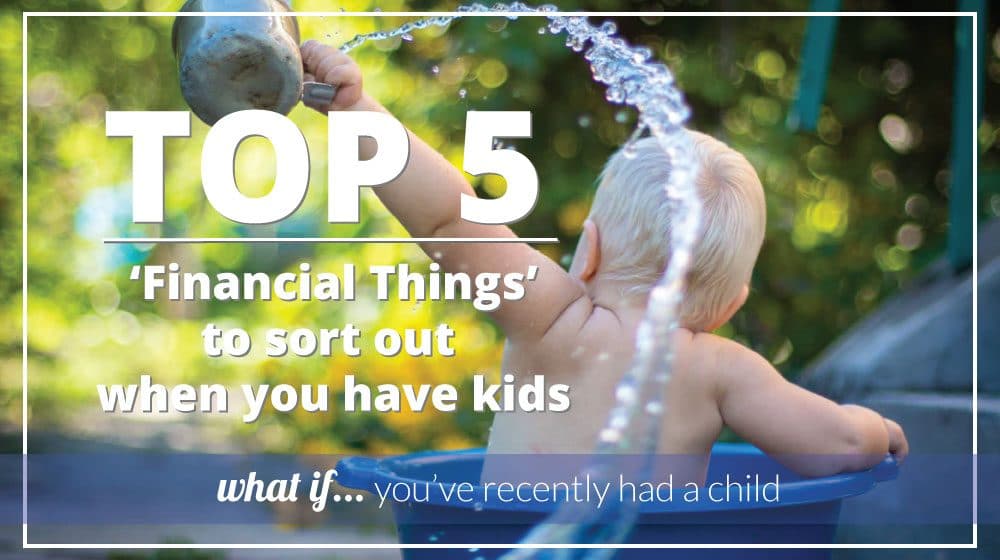Once a week I hear from people who haven’t started a family yet.. “Ah that’s not important – We’ll sort that out when we have kids”
Then in the whirlwind that is life with a baby (or toddler… or teenager … ) life never gives you a moment to sort these things out.
Its time to make time.
Make sure you get to these important tasks – or get someone to sort it out for you.
1. Get an Emergency Fund (What if…. something unexpected happens?)
We all know we need money for a rainy day – but do you have an amount of money specifically set aside for such an occasion?
How much do you need?
Where should you keep your emergency fund?
****How do get an emergency fund quickly and easily!****
What defines an emergency?
How much do you need?
Well, the “more the better” is an easy answer – however that’s not really practical.
A good rule of thumb is 10% of your annual income. Making $70k per year, maybe you should have $7k stashed away somewhere.
If you don’t have any income protection insurance – this number will need to be larger!
Where should you keep it?
High interest savings account or in your offset account.
Whenever you’re putting cash aside, pop it into a high interest savings account – it won’t make you a million in interest, however it’s better than a basic account. (Also Check out below “Putting money aside for a child” for more options)
If you have home loan, you should have an offset account. Any money added here will save you the interest you would have paid on that money (thus better than the savings account!)
How to get an emergency fund quickly and easily!
“Top up loan” or a credit card.
If you don’t already have an emergency fund or a lump sum of savings, it can take a long time to save up.
Here are two great ways to get an emergency fund quickly. (These aren’t the most cost effective ways – but they are better than not having an emergency fund)
Credit Cards – they have a high interest rate, and there are so many bad things associated with them. However if you don’t have cash, a credit card hidden away for a rainy day can get you out of a pickle
Top up loan – if you have equity in your home, you could potentially apply for a ‘top up loan’. (Ie if you have a $500k home, and a $300k loan, the bank may lend you up to 80% of the value, and therefore you may have access to up to $100k for your emergency fund.
What defines an emergency?
The last thing you want to do is spend time saving up an emergency fund (or getting a top up loan/credit card) – and then off you go and spending it on a family holiday.
So once you’ve set aside your emergency fund – sit down with your partner and decide what exact defines an emergency. This might sound simple – however both of you need to be on the same page. Is something really inconvenient (like a broken down car), just a hassle or is it an emergency? This is something you have to decide for yourselves, but definitely worth a conversation.

2. Wills & Power of Attorney (What if… your children lose their parent(s)?)
You know you need a Will. You’ve thought about it since having kids, you’ve mentioned it to your partner a couple of times, but just never seemed to get around to it…
Our life expectancy is well over 80; so heading down to the local lawyer to get a will done rarely finds its way to the top of the priority list – however its time it gets there.
You need a will! – and there are more reasons you need a will than you may have previously considered.
Life expectancy & causes of death
If something happens to one or both parents – there are a number of things to be considered:
- Probate: When someone passes away, it can take a LONG time to finalise an estate (average is between 6-9 months). This process is called ‘probate’ – during this period your family needs access to quick to quick funds (through life insurance etc) and it’s important to try and make this period as short as possible. Having a will and power of attorney will get funds moving a lot quicker. (Can you family sustain your current lifestyle if no income or insurance payment was coming in for 6-9 months?)
- Testamentary Trust: Lets say you’ve been a good parent and made sure you have suitable life insurance in place to provide to your family. What happens if both parents pass away – where should the funds go? Do you want a lump sum going to your children? Or do you want that money set aside in a trust, with an annual amount going to your kids. (Perhaps you give your kids to a guardian – would you like the family/friends who will be looking after your kids to get a lump sum? Or an annual income?
- Guardian & Parenting Notes: Have you chosen a guardian for your kids? Have you told the people you’ve chosen? (Also consider telling both sides of the family prior to the an event to reduce stress/confusion)? Have you outlined how you would like your children to be brought up in the event of your death? These notes could/should be added to your will.
- Linking your Super: Most states in Australia look at your ‘Estate’ and your ‘Super’ as different ‘Worlds’. Maybe these should be linked through your will, or maybe you want to keep these separate; there are pros and cons to linking your Super and your Estate – this should be discussed with your lawyer/financial adviser.
- Consider Tax: Depending on who you chose to distribute your assets to, different beneficiaries are taxed differently – this needs to be considered, and can be the difference of thousands (if not hundreds of thousand) dollars; again, discuss this one with your Financial Adviser.
With all of this in mind – maybe its time to get a will! (There are also more cost effective ways than the thousand dollars+ your lawyer will charge you)
Contact us to find out how to get a FREE WILL (not a free will kit….. a FREE WILL)

3. Putting Money Aside for Children (What if…. you could save money for the kids, and not pay tax on the capital gains!)
There are many reasons to put money aside for your children over the years as they grow up.
- Paying for their first car
- Paying for private school fees or university
- A home deposit (or partial deposit)
- Insurance Fund (What if something happens)
- And plenty more.
Much like saving for your emergency fund, a high interest cash account or your offset account are some of the most popular ways to save – however when dealing with long periods of time (7-10 years+) there is an alternative.
They used to be called insurance bonds, now more commonly ‘investment bonds’ – they government has given a tax concession to anyone wanting to save & invest for the long term.
Lets say you put money aside, $1000 a year, over 30 years = $30,000. You also decided to invest that money along the way and made 5% every year. Well you’d actually have $66k+ – unfortunately when you sold your shares/investment, Mr Taxman is going to ask for Capital gains tax (CGT) on the extra $36k that you made!
If this money was invested via an “investment bond”, no capital gains tax would be payable. Yep $0 tax.
There are a number of considerations, ‘The 10 Year Rule’ + ‘The 125% rule’ and how the money is invested – Ask your financial adviser for help!
https://www.moneysmart.gov.au/investing/complex-investments/investment-and-insurance-bonds
Interesting Idea: Give this as an option to your friends and family for Birthday & Xmas presents for your child – think of all the money spent on toys over a child’s life – half of that put into an investment bond will give them such a head start!
4. Insurance for the parents (What if… you or your partner can’t work?)
Insurance is a boring topic who wants to talk about getting sick or dying. It can be expensive, and too often people are SOLD insurance, rather than having an insurance STRATEGY.
When you don’t have kids – insurance is important (ie if you break your back, what are you going to do? move back in with your parents?)
When you do have kids – insurance is more than important, it’s paramount!
What if… you can’t work and can’t pay your mortgage, selling the family home and having to re-locate comes around a lot quicker than you’d think.
What if… the main breadwinner passes away, at the age of 40, there was potentially another 25 years of income coming into the family (at $80k per year, how does the family replace the $2,000,000 that would have come in over those 25 years).
If one parent stays at home with the kids, that doesn’t mean they shouldn’t be insured – if they can’t perform daily activities or pass away – will the other partner be able to continue to work? Will you need to hire a full time nanny? (That’s the equivalent of $60k per year or maybe $600k until the kids get a bit older). Even if a partner isn’t working or bringing in as much – life with out them can still be financially very expensive.
Consider your insurance strategy!
5. Insurance for the children (What if… something happens to one of your children?)
Insurance for the parents isn’t an uncommon discussion point – however what if something happens to your children?
A severe burn, a major illness – Medicare and your private health insurance will pay for most of the medical expenses – however what if you need to take time off work?
A combination of insurance for children should be considered.
Aside from your emergency fund and dipping into the kids college fund… there is another option.
Some insurances activate when your children get sick; if you don’t have any, this should be reviewed, and you should check with your provider as to whether or not there is any payment in the event something happens to your children.
Once a week I hear from people who haven’t started a family yet.. “Ah that’s not important – We’ll sort that out when we have kids”
Then in the whirlwind that is life with a baby (or toddler… or teenager … ) life never gives you a moment to sort these things out.
Its time to make time.
Make sure you get to these important tasks – or get someone to sort it out for you.
1. Get an Emergency Fund (What if…. something unexpected happens?)
We all know we need money for a rainy day – but do you have an amount of money specifically set aside for such an occasion?
How much do you need?
Where should you keep your emergency fund?
****How do get an emergency fund quickly and easily!****
What defines an emergency?
How much do you need?
Well, the “more the better” is an easy answer – however that’s not really practical.
A good rule of thumb is 10% of your annual income. Making $70k per year, maybe you should have $7k stashed away somewhere.
If you don’t have any income protection insurance – this number will need to be larger!
Where should you keep it?
High interest savings account or in your offset account.
Whenever you’re putting cash aside, pop it into a high interest savings account – it won’t make you a million in interest, however it’s better than a basic account. (Also Check out below “Putting money aside for a child” for more options)
If you have home loan, you should have an offset account. Any money added here will save you the interest you would have paid on that money (thus better than the savings account!)
How to get an emergency fund quickly and easily!
“Top up loan” or a credit card.
If you don’t already have an emergency fund or a lump sum of savings, it can take a long time to save up.
Here are two great ways to get an emergency fund quickly. (These aren’t the most cost effective ways – but they are better than not having an emergency fund)
Credit Cards – they have a high interest rate, and there are so many bad things associated with them. However if you don’t have cash, a credit card hidden away for a rainy day can get you out of a pickle
Top up loan – if you have equity in your home, you could potentially apply for a ‘top up loan’. (Ie if you have a $500k home, and a $300k loan, the bank may lend you up to 80% of the value, and therefore you may have access to up to $100k for your emergency fund.
What defines an emergency?
The last thing you want to do is spend time saving up an emergency fund (or getting a top up loan/credit card) – and then off you go and spending it on a family holiday.
So once you’ve set aside your emergency fund – sit down with your partner and decide what exact defines an emergency. This might sound simple – however both of you need to be on the same page. Is something really inconvenient (like a broken down car), just a hassle or is it an emergency? This is something you have to decide for yourselves, but definitely worth a conversation.
2. Wills & Power of Attorney (What if… your children lose their parent(s)?)
You know you need a Will. You’ve thought about it since having kids, you’ve mentioned it to your partner a couple of times, but just never seemed to get around to it…
Our life expectancy is well over 80; so heading down to the local lawyer to get a will done rarely finds its way to the top of the priority list – however its time it gets there.
You need a will! – and there are more reasons you need a will than you may have previously considered.
Life expectancy & causes of death
If something happens to one or both parents – there are a number of things to be considered:
- Probate: When someone passes away, it can take a LONG time to finalise an estate (average is between 6-9 months). This process is called ‘probate’ – during this period your family needs access to quick to quick funds (through life insurance etc) and it’s important to try and make this period as short as possible. Having a will and power of attorney will get funds moving a lot quicker. (Can you family sustain your current lifestyle if no income or insurance payment was coming in for 6-9 months?)
- Testamentary Trust: Lets say you’ve been a good parent and made sure you have suitable life insurance in place to provide to your family. What happens if both parents pass away – where should the funds go? Do you want a lump sum going to your children? Or do you want that money set aside in a trust, with an annual amount going to your kids. (Perhaps you give your kids to a guardian – would you like the family/friends who will be looking after your kids to get a lump sum? Or an annual income?
- Guardian & Parenting Notes: Have you chosen a guardian for your kids? Have you told the people you’ve chosen? (Also consider telling both sides of the family prior to the an event to reduce stress/confusion)? Have you outlined how you would like your children to be brought up in the event of your death? These notes could/should be added to your will.
- Linking your Super: Most states in Australia look at your ‘Estate’ and your ‘Super’ as different ‘Worlds’. Maybe these should be linked through your will, or maybe you want to keep these separate; there are pros and cons to linking your Super and your Estate – this should be discussed with your lawyer/financial adviser.
- Consider Tax: Depending on who you chose to distribute your assets to, different beneficiaries are taxed differently – this needs to be considered, and can be the difference of thousands (if not hundreds of thousand) dollars; again, discuss this one with your Financial Adviser.
With all of this in mind – maybe its time to get a will! (There are also more cost effective ways than the thousand dollars+ your lawyer will charge you)
Contact us to find out how to get a FREE WILL (not a free will kit….. a FREE WILL)

3. Putting Money Aside for Children (What if…. you could save money for the kids, and not pay tax on the capital gains!)
There are many reasons to put money aside for your children over the years as they grow up.
- Paying for their first car
- Paying for private school fees or university
- A home deposit (or partial deposit)
- Insurance Fund (What if something happens)
- And plenty more.
Much like saving for your emergency fund, a high interest cash account or your offset account are some of the most popular ways to save – however when dealing with long periods of time (7-10 years+) there is an alternative.
They used to be called insurance bonds, now more commonly ‘investment bonds’ – they government has given a tax concession to anyone wanting to save & invest for the long term.
Lets say you put money aside, $1000 a year, over 30 years = $30,000. You also decided to invest that money along the way and made 5% every year. Well you’d actually have $66k+ – unfortunately when you sold your shares/investment, Mr Taxman is going to ask for Capital gains tax (CGT) on the extra $36k that you made!
If this money was invested via an “investment bond”, no capital gains tax would be payable. Yep $0 tax.
There are a number of considerations, ‘The 10 Year Rule’ + ‘The 125% rule’ and how the money is invested – Ask your financial adviser for help!
https://www.moneysmart.gov.au/investing/complex-investments/investment-and-insurance-bonds
Interesting Idea: Give this as an option to your friends and family for Birthday & Xmas presents for your child – think of all the money spent on toys over a child’s life – half of that put into an investment bond will give them such a head start!
4. Insurance for the parents (What if… you or your partner can’t work?)
Insurance is a boring topic who wants to talk about getting sick or dying. It can be expensive, and too often people are SOLD insurance, rather than having an insurance STRATEGY.
When you don’t have kids – insurance is important (ie if you break your back, what are you going to do? move back in with your parents?)
When you do have kids – insurance is more than important, it’s paramount!
What if… you can’t work and can’t pay your mortgage, selling the family home and having to re-locate comes around a lot quicker than you’d think.
What if… the main breadwinner passes away, at the age of 40, there was potentially another 25 years of income coming into the family (at $80k per year, how does the family replace the $2,000,000 that would have come in over those 25 years).
If one parent stays at home with the kids, that doesn’t mean they shouldn’t be insured – if they can’t perform daily activities or pass away – will the other partner be able to continue to work? Will you need to hire a full time nanny? (That’s the equivalent of $60k per year or maybe $600k until the kids get a bit older). Even if a partner isn’t working or bringing in as much – life with out them can still be financially very expensive.
Consider your insurance strategy!
5. Insurance for the children (What if… something happens to one of your children?)
Insurance for the parents isn’t an uncommon discussion point – however what if something happens to your children?
A severe burn, a major illness – Medicare and your private health insurance will pay for most of the medical expenses – however what if you need to take time off work?
A combination of insurance for children should be considered.
Aside from your emergency fund and dipping into the kids college fund… there is another option.
Some insurances activate when your children get sick; if you don’t have any, this should be reviewed, and you should check with your provider as to whether or not there is any payment in the event something happens to your children.





